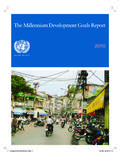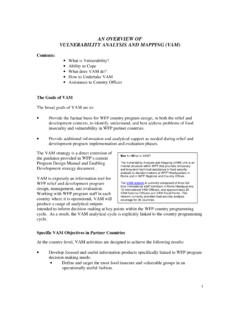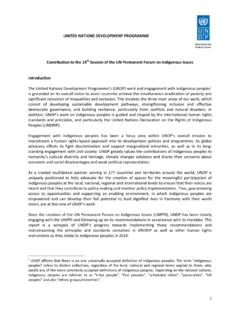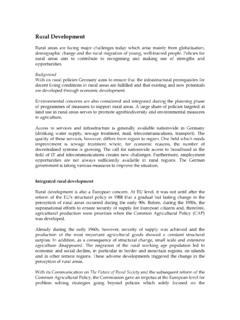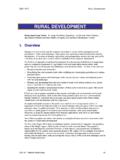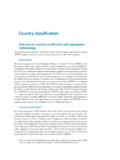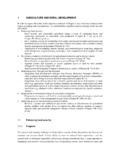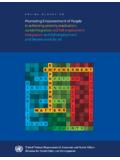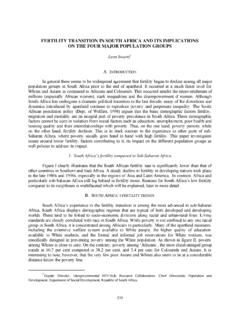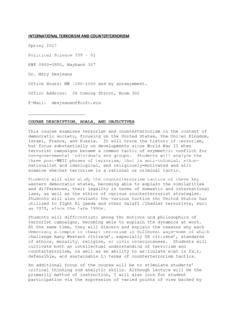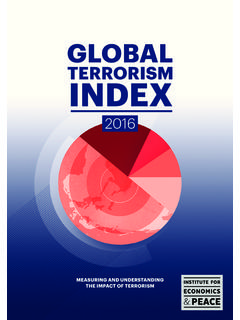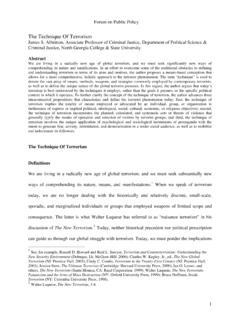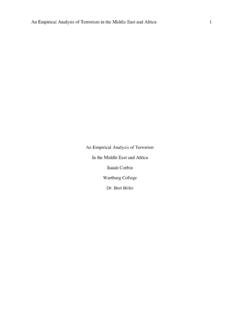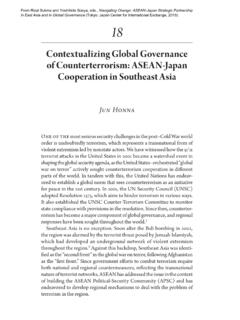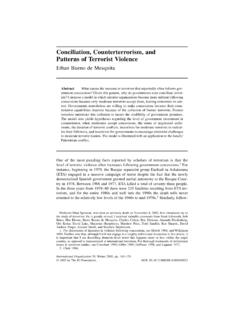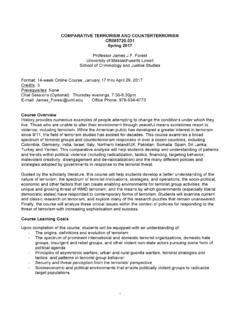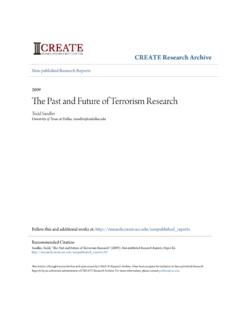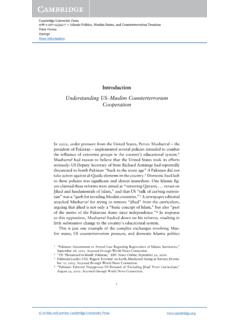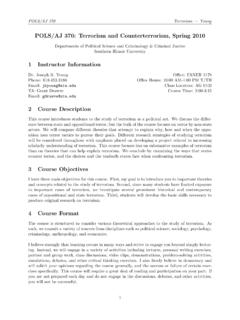Transcription of Enhancing the Understanding of the Foreign Terrorist ...
1 united nations Office of counter - terrorism Enhancing the Understanding of the Foreign Terrorist Fighters Phenomenon in Syria July 2017. This study was conducted by Professor Hamed el-Said and Mr. Richard Barrett, consultants, UN counter - terrorism Centre, (UNOCT). Table of Contents I. Executive Summary 4. 1. Key Findings _____ 5. 2. Policy Implications _____ 7. II. Introduction 9. 1. Background of the FTFs Project _____ 10. 2. Goals and Objectives _____ 12. 3. Methodology _____ 13. III. Literature Review _____ 15. IV. Who Becomes an FTF? _____ 26. 1. Biographies of FTFs _____ 26. Marital & Family Status _____ 27. Level of Education _____ 30. Economic Status _____ 31. 2. Motivations to Join Transnational Terrorist Organizations _____ 35. Self-radicalization and the Role of Social Networks _____ 35. The Role of Ideology _____ 37.
2 The Role of Financial Incentives and Material Rewards _____ 38. The Role of the Internet _____ 41. 3. Motivations to Abandon Transnational Terrorist Organizations _____ 43. The Role of Social Networks and Families _____ 43. The Reality of War _____ 44. The Role of the Internet and Social Media _____ 45. Disappointment and Disillusionment _____ 45. V. Conclusion and Recommendations _____ 47. VI. Policy Implications _____ 49. 1. At the National level _____ 49. 2. At the Regional level _____ 49. 3. At the International Level _____ 50. VII. Limitations of the Study _____ 52. VIII. Appendix 1. Anonymized list of interviewees _____ 54. 2. Table: FTF Implementation Plan Submitted Projects _____ 57. I. Executive Summary During the fourth biennial review of the Global counter - terrorism Strategy held in September 2014, Member States expressed concern at the growing phenomenon of Foreign Terrorist Fighters (FTFs) in Syria.
3 As a result, the Secretary-General announced that the united nations Centre for counter - terrorism (UNCCT) would, in cooperation with those Member States that wished to participate, gather information on the motivation of FTFs through direct interviews of returnees. By analysis of the results, the Secretary-General aimed to provide Member States with a stronger knowledge base from which to understand the phenomenon of FTFs, assess the risks they posed, and develop effective responses. Accordingly, in November 2014, the Executive Chairman of UNCCT and Under-Secretary- General for Political Affairs invited all Member States to facilitate united nations access to FTFs within their jurisdictions. Despite limited cooperation,1 UNCCT interviewed 43 individuals between August 2015 and November 2016, representing 12 nationalities.
4 Thirty three (77 per cent) of the interviewees reached Syria but subsequently decided to leave, while the remaining ten (23 per cent) began the journey but were stopped en route, either on their own or in a transit country. Two interviewees are of Syrian origin, though they were not living in Syria when they were interviewed, while the rest fulfil the definition of Foreign Terrorist fighters included in Security Council resolution 2178 (2014). The responses of the interviewees provide important insights into the motivations of individuals to leave their countries of residence or nationality to join armed groups in Syria. It is important to note that more often than not, individuals do not necessarily select the group they finally join. Rather, once they reach Syrian territory, some seem to join the group that operates closest to their point of arrival.
5 Fighters also seem to be switching groups. The aim of this report is to expand Understanding of the FTF phenomenon in Syria by examining why the interviewees chose to act in the way they did. The report records the reasons individual FTFs have given to explain their decision to leave their countries of residence or nationality to join armed groups. It also records their reasons for leaving these groups and returning to their countries of residence or nationality before achieving the goals and objectives they had set themselves. Finally, the report seeks to draw conclusions as to the threat that returning FTFs may pose in the future. In order to conduct this study, the united nations has engaged directly with returned Terrorist fighters. It has done so to improve international Understanding of a global phenomenon that represents one of the gravest current threats to national, regional and international security.
6 By equipping policy makers with greater knowledge and Understanding of the motivations of FTFs 1. Ultimately only seven Member States cooperated by facilitating access to returning FTFs. 2. the united nations may help them design and implement effective and appropriate responses that can stem the flow of FTFs, redirect the future of returnees, and reintegrate them with minimum risk to public safety. While the international community has more often been preoccupied with the study of Terrorist organizations as a whole, this report focuses on the individuals who join them. The reasons they give for doing so, and the reasons they give for leaving may help to explain the strengths and weaknesses of the appeal of terrorism within the context of the civil war in Syria. The sample group is relatively small compared to the overall number of FTFs, 2 and many of those interviewed found it hard to articulate what led them to take the decisions they made.
7 However, certain patterns are detectable. 1. Key Findings There is no one profile for FTFs and this report warns against sweeping generalisations. Some of its findings confirm the results of other, similar studies, while other findings suggest that different samples will prompt different conclusions. For example: most FTFs interviewed in this study are young, male and without an advanced education. Perhaps contrary to general perceptions, the report finds that many FTFs serving as foot soldiers lack opportunity, are disadvantaged economically, lack education and have poor labour prospects, even when they come from Western societies. Most FTFs in this sample come from large families in urban communities that are rather isolated from mainstream social, economic and political activity. Some of the families from which these particular FTFs come often show signs of internal dysfunction or stress.
8 FTFs leave their country of residence for different reasons. Push and pull factors intertwine in different ways according to the individual and the internal and external environment each one faces. While this survey suggests that economic factors have become more important as a push factor than was the case in earlier waves of FTFs, for example to Afghanistan in the 1980s, other political and social factors have contributed in varying degrees. The push factors are also inevitably more country-specific than the pull factors. Religious belief seems to have played a minimal role in the motivation of this FTF sample. Unresolved conflicts that include inter-communal violence appear to be one of the strongest magnets for FTFs. A sense of identity with - and a desire to help - co-religionists who are perceived as victimised and mistreated by other groups has developed into a sense of obligation to act in defence of one's in-group.
9 This was one of the most common reasons that individual FTFs in our sample gave for travelling to Syria. Empathy with the Sunni communities in Syria that are portrayed as being under attack as much for their belief as for any other reason was a common theme. For some, this sense of brotherhood was reinforced by a sense of religious obligation. 2. Estimated by the Analytical Support and Sanctions Monitoring Team established pursuant to resolution 1526. (2004) in March 2015 at more than 25,000 individuals from more than 100 Member States. P. 7. 3. Social and personal networks are key mechanisms in the evolution of a FTF. The survey finds that a decision to go to Syria is almost invariably linked to social networks formed in gathering places such as mosques, prisons, schools, universities, neighbourhoods or the workplace.
10 These networks often become stronger in the intensity of the battlefield, but also more exclusive, with weaker members being pushed to the margins over time. In more general terms, there is inevitably a personal' factor that persuades one individual to become a FTF while his neighbour, or even his sibling, although exposed to exactly the same environment and subject to the same conditions conducive to radicalisation and extremism chooses to remain at home. These factors are among the hardest to discover, and although of great importance to the individual, are likely to be the least susceptible to any broad-based intervention at the community level. The respondents of this survey claimed they did not go to Syria with the intention of becoming a Terrorist , nor did they return with that purpose in mind. However, some may remain vulnerable to outside influences, or become unpredictable as a result of the psychological consequences of their experience.
